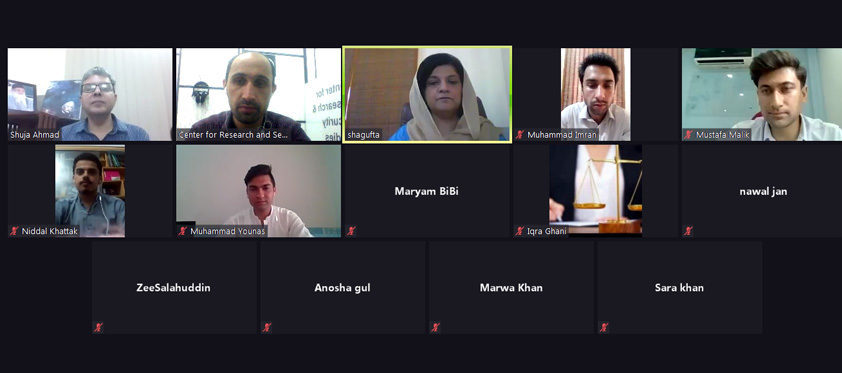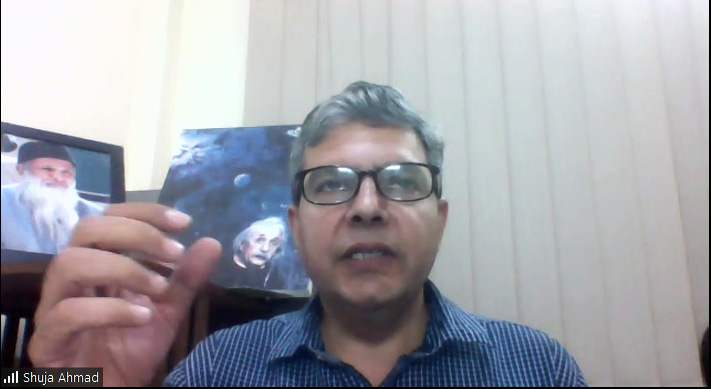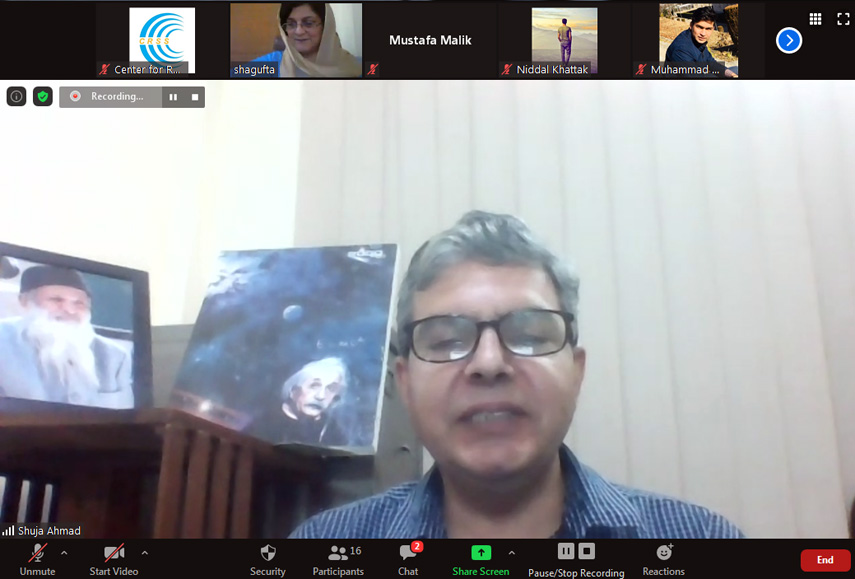“The only safeguard against reasoning ill is the habit of reasoning well; familiarity with the principles of correct reasoning, and practice in applying those principles” (John Stuart Mill). This was quoted by Dr. Shuja Ahmad, Chairman, Department of Philosophy, University of Peshawar, while setting the keynote for his presentation on critical thinking and the art of reasoning.
He noted that critical thinking is about using logic and critical inquiry to gather and connect the available information and draw inferences. It helps processing the information more effectively to be able to draw logical conclusions. This kind of thinking is also called the process of reasoning where an argument is an expression of reasoning in words. Making arguments with reasoning devoid of logic and critical thinking represents bad reasoning and flaw in an argument means flaw in the reasoning and thinking.
Training in logic and critical thinking enables us to construct and objectively evaluate arguments, differentiate good reasoning from bad reasoning, identify relevance of ideas, and think correctly and clearly. Normally we do not question ourselves but with this skillset, not only just others but one also starts reflecting on the justification of ones’ own ideas, theories, and values. This stage can be termed as the culmination of critical thinking.
It is also the best and most democratic way to get someone to come around to your point of view i.e. through making good arguments and dialogue instead of forcefully imposing your views on others. This process of reasoning with critical thinking at the core can help solving problems in a systematic manner and critical to complex problem solving.
According to California Critical Thinking Disposition Inventory, a tool to measure the disposition to engage problems and make decisions using critical thinking, there are seven habits essential to critical thinking, such as: i) Truth-Seeking; by challenging the known and finding the unknown to find the truth, ii) Open-Mindedness; being receptive to new ideas even if you do not agree to them or they are against your worldview, but at least give them a fair and objective hearing, iii) Analyticity; not following something blindly or acting impulsively, instead, understanding the reasons behind things and evaluating the pros and cons of your decisions, iv) Systematicity; breaking down a complex problem into parts, v) Confidence in Reasoning; having data and logical connection between the information at hand, thus having reasons to support one’s argument, vi) Inquisitiveness; curiosity to ask questions, vii) Maturity of Judgement; never jumping to conclusion in haste without seeing things from different perspectives while also taking into consideration the experiences of others besides just one’s own.
Argument is the key idea in logic and critical thinking. It is an essential element in the art of reasoning. An argument comprises statements where one statement (conclusion) is claimed to be followed by others (premises). It includes premises and conclusion where the former forms the basis of an argument and from which the latter; a conclusion is drawn. The premise is aimed to provide grounds or pillars for conclusion. Argumentation involves the method of establishing that a proposition has an adequate evidential support for its acceptance and to form a basis for conclusion.
A statement is a cognitively meaningful sentence that can be affirmed or denied due to their empirical or analytical nature and in a process of serious argumentation, you should present your case in statements and not in ordinary sentences. All statements are sentences but all sentences are not statements.
Critical thinkers aim to come up with meaningful and objective arguments themselves with empirical or analytical statements at the core and that is why they are able to identify flawed arguments, devoid of sense and data. Arguments are strong when their premises are relevant to the conclusion and the conclusion is modest.
If we come across a flawed argument and do not agree with it, do not reject the conclusion, but reject the pillars of that argument instead i.e. premises. We should be mindful of the negative consequences of negating the conclusion and not highlighting the flawed premises as doing so evokes it and can make unpopular arguments popular.
As critical thinkers, we should be able to identify fallacies; errors in reasoning, including fallacies of false generalization. Fallacy is a type of argument that may seem to be correct but that proves not to be so on close examination. Also, it is important to be cognizant of “Argument Against Man”. This means that no argument should be judged; accepted or rejected, on the basis of the person who presents it, especially when the personal character, background or special circumstances of an arguer have nothing to do with the argument. Logic and critical thinking only see the argument, not the arguer; and it only allows you to criticize the argument, not the person putting forth the argument.
Without criticism, we cannot think outside the box, learn something new and grow, so we should always welcome the critics in our life and criticism on our arguments. This is what makes our argument strong. Criticism does not literally mean to criticize; it is about constructive feedback while being considerate of all the related aspects and objectively looking at the issue through different perspectives.
As seen in the world, the mindset change with critical thinking skills at the core is most crucial to the socio-political and economic progress, and democratic development. Only critically thinking nations can uphold rule of law and resist tyranny and arbitrary use of power.
The event was participated by youth leaders from different public and private sector universities across Khyber Pakhtunkhwa, and held as part of the Center for Research and Security Studies’ (CRSS) efforts to continue to cultivate the young through online conduits for communication, in the absence of physical platforms of youth engagement and development during COVID-19 times.
About Ulasi Taroon:
Ulasi Taroon is a counter radicalization initiative of CRSS that aims to address the radicalization challenges and extremist ideologies and foster social cohesion in KP through a discourse anchored in the core constitutional values. The endeavors aim cultivate and sensitize the target groups in these core values highlight the criticality of abiding by these concepts – such as adherence to rule of law, primacy and sanctity of constitution, equal citizenry, respect for fundamental human rights, tolerance for diversity and different opinions, inclusive democracy and good governance – as a measure of fostering social cohesion and peaceful co-existence.



